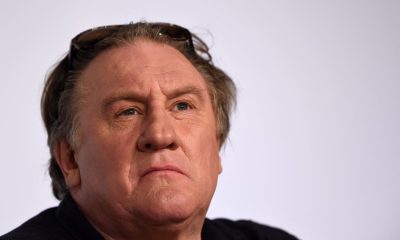ART NEWS
The Social Power of Music Will Take Center Stage at the 53rd Annual Smithsonian Folklife Festival | At the Smithsonian
[ad_1]
This weekend on the National Mall in Washington, D.C., you can catch a set by Filipino-American rapper and spoken word artist Ruby Ibarra, a tribute concert in honor of folk singer and activist Pete Seeger or a sonic history of hip-hop with legendary DJ Grandmaster Flash—or all three. These performances, and others throughout the weekend, are part of the 53rd annual Smithsonian Folklife Festival, which is celebrating the “social power of music.”
The Folklife Festival, which began in 1967 and takes place each summer, gathers musicians, artists and performers to recognize and explore culture and traditions from across the United States and around the world. Although this year’s festival is shortened to just two days, largely due to delays caused by the government shutdown, festival director Sabrina Motley says attendees will still walk away with a full Folklife experience and a greater appreciation of music as a source of connection. As the organizers shifted the event’s scope and scale down from the usual 10-day format (which will return next year), they embraced the opportunity to fully explore D.C.’s own musical heritage. Motley tells Smithsonian.com, “We really turned our attention to local music, culture and history, in keeping with the work the festival has done since its inception.”
The festival will kick off Saturday with the D.C. Music Preservation Pop-Up, organized by Folklife curators Sojin Kim and Nichole Procopenko. An afternoon filled with digitization workshops led by the DC Public Library, a local record label market and jam and listening sessions, it’ll be rounded out by a go-go performance by The Royal Pocket Tour, featuring some of the activists behind the #DontMuteDC campaign.
The campaign began when an electronics store that has long played go-go music outside its doors was forced to turn it off because a tenant of a neighboring luxury apartment building complained. After 80,000 people signed a petition in support of the store, it was allowed to start playing its music again. Since its start in April, #DontMuteDC has led to a larger discussion about gentrification in D.C. and a celebration, most recently at the BET Awards, of the city’s unique contributions to music.
The goal of the Pop-Up is to recognize that D.C. has an “incredibly musical past and a really dynamic musical present,” Kim explains. Today, Folklife’s website states, D.C. is “a hometown, the nation’s capital, a tourist destination, a sanctuary city, an international crossroads, and a Chocolate City whose once black majority is now a black plurality.” All of that informs the music being produced by the community. “People [who] come up through school music programs, churches [and] family traditions of music create really incredible art as well as social tools from their music,” Kim says.
Throughout the weekend, attendees will also have the chance to record personal five-minute “music memories” with the Ralph Rinzler Folklife Archives with the DC Oral History Collaborative. “We demonstrate what we value by what we preserve,” Kim says. “We recognize the value of preserving and making sure that these stories and these individuals are in the historic record in perpetuity.”
The Saturday evening program, “The Fierce Urgency of Now: Modern Troubadours, Poets, and Wordsmiths,” highlights Ibarra, Chicano rock band Quetzal featuring Alice Bag and La Marisoul and D.C. hip-hop artist and producer Kokayi—artists, Motley says, “who are carrying important messages from and to community.”
The events on Sunday will expand the celebration of social music, with a family-oriented concert in honor of Pete Seeger’s legacy. To mark the centennial of his birth last month, Smithsonian Folkways released a new box set, featuring previously unreleased tracks. The festival will continue with zine and maraca making workshops, community sings and drum circles before hip-hop artist Grandmaster Flash, who recently became the first DJ to win the Polar Music Prize, often called the “Nobel Prize For Music,” takes the stage to close out the festivities.
Procopenko hopes Folklife attendees take away that there’s “more to D.C. than just what you [usually] see on the Mall.” But for this Saturday and Sunday at least, go ahead and come down to the Mall to see it all.
Saturday, June 29
D.C. Music Preservation Pop-Up
12 – 5 p.m.
Freer Plaza
Local Record Label Market
12 – 5 p.m.
Freer Plaza
Crown Vic and Area Woman’s Weird World Record Party
12:05 – 4 p.m.
Freer Plaza
Music Story Time
12:30 – 1:15 p.m.
Freer Plaza
Go-Go PA Tape Listening Session
1:15 – 2 p.m.
Freer Plaza
D.C. Bluegrass Union Jam
2 – 4 p.m.
The Lawn
Percussion Workshop with Malik DOPE Drummer
2 – 3 p.m.
Freer Plaza
Black Girls Handgames Project
3 – 3:45 p.m.
Freer Plaza
Go-Go PA Tape Listening Session
3:45 – 4:30 p.m.
Freer Plaza
Go-Go Performance: The Royal Pocket Tour
4:30 – 5 p.m.
The Lawn
The Fierce Urgency of Now: Modern Troubadours, Poets, and Wordsmiths
Ruby Ibarra (6 – 7 p.m.), Quetzal ft. Alice Bag and La Marisoul (7:15 – 8:30 p.m.) and Kokayi ft. Jenna Camille (8:45 – 10 p.m.)
6 – 10 p.m.
Main Stage
Sunday, June 30th
Smithsonian Folkways Family Concert Honoring the Legacy of Pete Seeger
The Bright Siders (10:30 – 11:15 a.m), Sonia De Los Santos (11:30 a.m. – 12:15 p.m.), Dan & Claudia Zanes (12:30 – 1:15 p.m.) and You Are My Flower (1:30 – 2:15 p.m.)
10:30 a.m. – 2:30 p.m.
Main Stage
Hands On Music: Drum Circle
11 a.m. – 3 p.m.
Freer Plaza
Hands On Music: Zine Making
11:30 a.m. – 2:30 p.m.
Freer Plaza
Family Open Studio: Musical Innovations
12 – 4 p.m.
Freer Plaza
Hands On Music: Maracas Making
1 – 2 p.m.
Freer Plaza
Community Sing
1:30 – 1:40 p.m., 2:30 – 2:40 p.m., 4:30 – 4:45 p.m.
Freer Plaza
Baltics Song & Dance
3 – 4:15 p.m.
Freer Plaza
Jourdan & Tarron
4:45 – 5 p.m.
Main Stage
Grandmaster Flash Presents Hip-Hop: People, Places, and Things – A Video Experience for Families
5 – 6:30 p.m.
Main Stage
Like this article?
SIGN UP for our newsletter
[ad_2]
Source link











